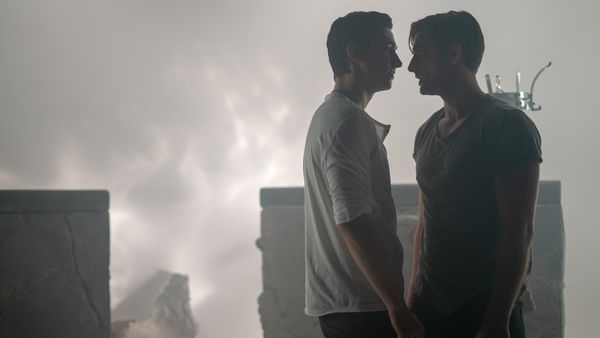Eye For Film >> Movies >> Hamlet/Horatio (2021) Film Review
Hamlet/Horatio
Reviewed by: Jennie Kermode

"Let me speak to the yet unknowing world/How these things came about," pledges Horatio at the end of Shakespeare's play. He's standing on or beside a stage, of course, not just as an actor but as a character, because it was Hamlet's plan to expose a murder plot by way of a play that led to the deaths of the leading characters. Itself a work prone to playing with structure and breaking the fourth wall, the play naturally lends itself to experimentation. Paul Warner's take hinges on that declaration and focuses on the friendship between Horatio and the prince, sometimes blurring the lines between the two, as it explores the concept of Horatio fulfilling his promise through film.
That friendship has been extensively explored through the centuries. Beyond Horatio's loyalty, we learn relatively little about him from the text itself, which leaves directors with plenty of room to reshape him as they endeavour to find fresh perspectives. The styling of Warner's version, which features Andrew Burdette as the prince and Themo Melikidze as his pal, teases the queer subtext often attributed to the pairing, but whether or not we read them as more than just good friends, it is the friendship that matters. Horatio is not only there at the end - he is there throughout, whenever Hamlet needs him, no matter how needy or unstable or outright murderous his friend becomes. What tends to be less successfully conveyed - and this is no exception - is what emotional resource Hamlet offers to him in return.

This is Hamlet with the emphasis on the former syllable. Burdette makes his gestures big and bold; Melikidze has little choice but to do likewise. The youth of the characters is a factor often overlooked and with that in mind - together with Hamlet's bereavement - the occasional tantrum might be excusable, but screen and stage have rarely seen a more petulant prince, and this makes for a tough 100 minutes. The more so because the stripped down production leaves us with very little else to watch.
Producer David Wenzel has likened making this film to remixing a song in the hope of introducing it to a new audience. The emphasis is very much on youth. Laertes (Wayne Stephens) and Ophelia (Phage Nolte) both get their moments, with Warner hinting at incestuous desire on the part of the former. The latter comes across as so dim that even lust for her is frankly difficult to countenance, and Nolte's take on her mental disintegration recalls the worst of amateur dramatics. Meanwhile, the older characters are pushed into the background. Gertrude's story is pared back so as to leave her little more than a punching bag, wasting the only thing approaching a nuanced performance (by Anna Maria Cianciulli).
The central problem here is that Warner has focused on one idea, spent years developing it, and completely forgotten about everything else. It may not be a new idea but there is some mileage to be found in the sometime intermingling of Hamlet and Horatio's identities, swapping lines between them. One might even imagine that the latter is surrendering his own personality to become a vessel for the former's story. It's not enough to save a production which is clumsily written and built upon almost uniformly awful performances. It's fair enough to transfer the play into modern language, which has been done successfully many times before, but in the absence of the rhythm and wit of Shakespeare's words there's simply nothing to keep viewers engaged. The drama drags on and on, its only noteworthy feat being that it manages to be overblown and profoundly underwhelming at the same time.
It is often assumed that critics enjoy writing bad reviews. I don't. I would far rather not find myself sitting through bad films. I write this in large part because I want to assure viewers who are new to the Bard that this really is not as good as it gets. Check out some of these cinematic Shakespeare adaptations for a real sense of his potential. Put this one out of your mind, lest more mischance on plots and errors happen.
Reviewed on: 29 May 2021















